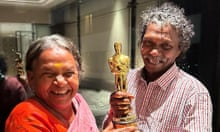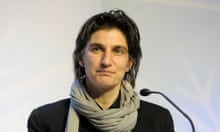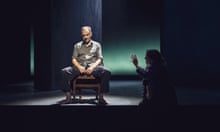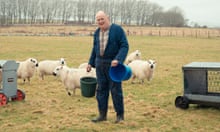It’s evident within minutes of Pamela, a Love Story, the new Netflix documentary on arguably the most recognizable blonde bombshell of the last 30 years, that Pamela Anderson is a stellar archivist of herself. Understated in a white T-shirt, sans makeup, typically bleach-blond hair loose and unstyled, Anderson leads the camera through trove after trove of records – VHS tapes, Hi8 footage, DVDs, dozens of notebooks marked by distinctively large, bubbled handwriting. Boxes of home videos and memorabilia, saved at her childhood home on Vancouver Island, all provided unrestricted to film-makers.
Pamela, a Love Story covers the full sweep of Anderson’s 55 years, from her turbulent childhood in the small island town of Ladysmith to her discovery by a Labatt beer scout at a Canadian football game, to her transformation into a Playboy cover girl and Baywatch babe, to the public fascination with her whirlwind marriage to rocker Tommy Lee. There’s the devastation of her intimate tape’s theft and distribution, later career stalls and hiccups, life with her two sons Brandon and Dylan, several marriages and few regrets.
In other words, plenty of material for a biography, though rarely mediated by anyone other than Anderson herself, generally with a laugh and a striking level of unguardedness and mostly through watching her watch her archive. There’s a softness to the film that owes something to how Anderson characterizes her own life and career – vulnerable, reflective, a little cheeky, seemingly bemused and baffled by celebrity. “You could definitely make a great biography of Pamela Anderson. I just did not want to do that,” director Ryan White told the Guardian. “I was just so captivated by her once I met her and how she sees the world … I wanted her to be the shepherd through her life story.”
White, who recently directed the Mars rover film Good Night Oppy, was at first wary of making a celebrity documentary, let alone one with such a larger-than-life, fraught image as Anderson’s. “I definitely pigeonholed her as a certain type of personality, which she ended up not being at all,” he said. He first met her through her son Brandon, a producer on the project; Anderson has said that she stepped back into the limelight with the film and her recently released memoir Love, Pamela at the encouragement of her sons, whom she shares with Lee.
On an initial Zoom call with Anderson from her farmhouse in Canada, White was “so captivated by how relatable she was”, he said. She seemed less interested in the film White would make about her than his life, his prior work, his mom. “She just seemed so different than the public persona”, he said, “that I thought if we could bottle this Zoom conversation up and translate it to documentary format, I think people are going to be really surprised.”
White and Anderson shared a mutual lack of interest in a typical celebrity PR film – no talking heads, no tie-in to a next project, no narrative of control or strategy. “She wasn’t willing to do things for drama, she wasn’t willing to do things to make a more traditional documentary,” said White. “She was very just, ‘This is it, make what you want out of it, but I’m not going to exaggerate anything.’”
That disarming frankness – mention and move on – is typical to how Anderson addresses dark periods in her life: her parents’ turbulent, off-and-on marriage, which foreshadows her volatile union with Lee (the Mötley Crüe drummer was sentenced to six months in jail for spousal abuse in 1998; they divorced after). Her molestation by a babysitter as a child and rape by a 24-year-old friend of a friend at age 12, which left her “very, very shy” and ashamed. She recalls her first photoshoot for Playboy warmly, her breast enhancement self-deprecatingly (“not a lot of thinking went into that decision … not a lot of thinking went into anything”), her work as a pin-up and actor proudly. The bombshell image represented, for her, self-empowerment and control, when her sexuality became a boon (and a romp) rather than a mark against her.
The only topic Anderson seems reluctant to discuss – and the only times during filming, White says, that she would get too nauseated to continue – is the tape: the theft of an intimate video made by Anderson and Lee shortly after their wedding, which was distributed without their consent and became a viral hit on the nascent internet. The sex tape, brought back into the public eye last year by the Hulu show Pam & Tommy, was devastating for Anderson both personally and professionally (the documentary offers ample evidence that so much of late-night television has aged so poorly). The public lampooning of her sexuality, she explains, recalled the worst fears after her rape as a child: “Not to bring up something heavy from my childhood, but when I was attacked by this guy, I thought everybody would know. When the tape was stolen, it felt like that.”

Anderson confirms that the Hulu series, which starred Sebastian Stan as Lee and Lily James as Anderson, rubbed “salt in the wound”, as she told Variety. (She holds nothing against James, she added.) At the time, Anderson said nothing publicly; she refocused unwanted attention to her Broadway debut as Chicago’s Roxie Hart for a winking, well-reviewed eight-week run (a personal triumph celebrated in the film’s final section). Her comments on the series in and around the documentary have only cast the decision to make the show without her in a harsher light. “They shouldn’t have been able to do it without my permission,” she says. “This feels like when the tape was stolen.”
As a documentary film-maker, “I have to believe staunchly that we should be able to tell stories about real people and real public figures,” said White of the series. But it was difficult to see Anderson “go through something that was such a traumatic moment from her life, and then have to relive it in the public eye”.
“I think we have to be very careful about choosing which stories we tell, and entertaining whether they could be retraumatizing victims, especially living victims,” he added. “And asking ourselves, is it worth it?” Is one person’s renewed pain worth entertainment, “no matter how popular it might be or how great it might be or however great one performance might be. Is that worth it?” Watching Anderson go through it, said White, “to me, it wasn’t worth it.”
Pamela, a Love Story is of a piece with several feminist reconsiderations of women in the public eye in the 90s and aughts, from Britney Spears and Janet Jackson, to Lorena Bobbitt, to Monica Lewinsky in Impeachment: American Crime Story. White sees Anderson as “another key part of that conversation or a key part to continuing that conversation”, in how she recalls her own treatment in the media, and participation in the bombshell image, with a mix of disappointment and bemusement but rarely bitterness. “She really challenges you not to land in those binaries, in the way that now we live in a very binary world where you have to see things one way or the other or you’re wrong,” he said. “Pamela really lives in that gray area.”
Anderson comes off, ultimately, as a romantic, freely jumping into love, loss, chaos and the process of putting it all in a documentary. She starts the film married to one man (“a good Canadian guy, normal, figured maybe I should try that”) and ends it divorced for the fifth time, determined to love herself. Anderson “loves an experience”, said White. “She’s a total free spirit. She’s a total artist. But she’s not calculating in any way.”
Unlike many a celebrity documentary, the lasting impression is not of a career mastermind but an open-hearted person still a little mystified by her own fame, and still figuring things out. “She’s never thinking about the end result,” said White. “She’s always staying in the moment and having a blast, or having a tragedy, at times.”
Pamela, A Love Story is on Netflix now









